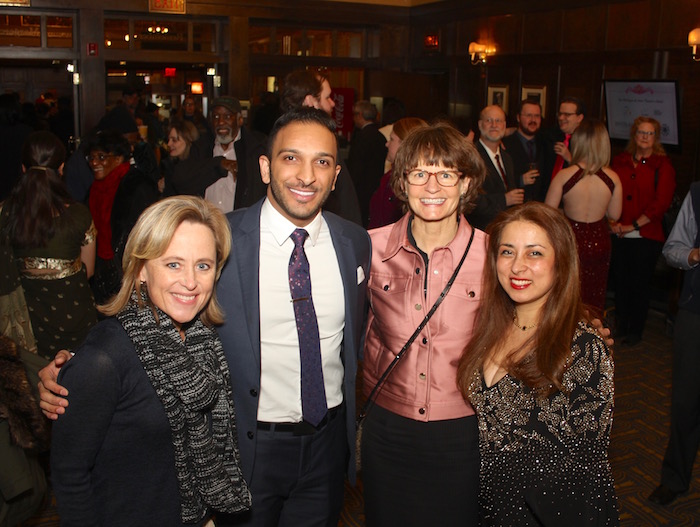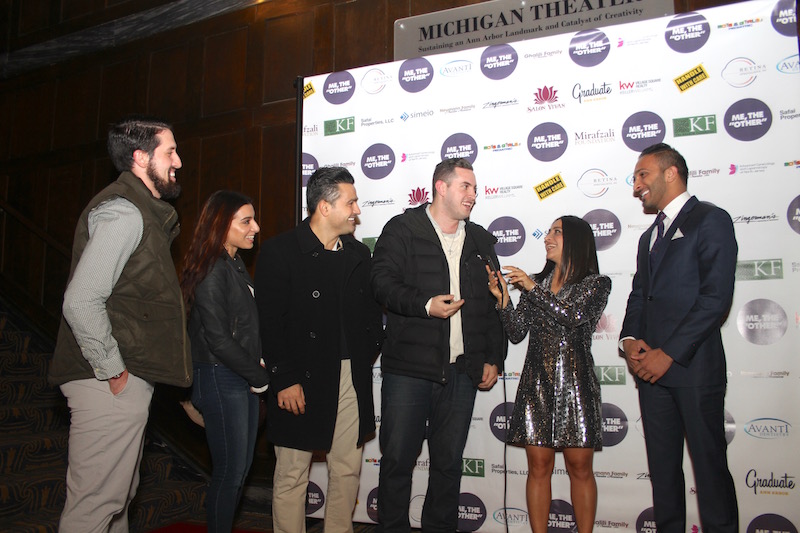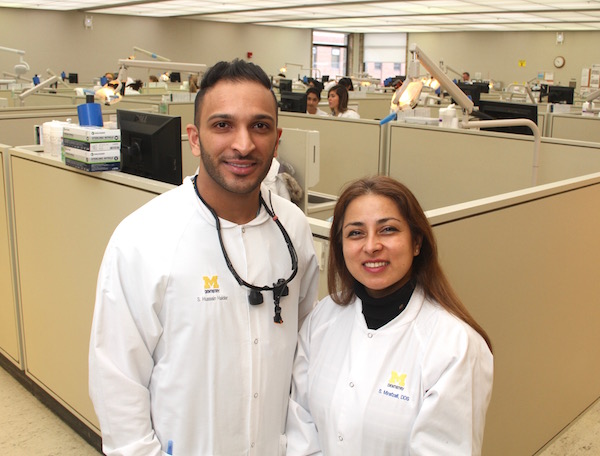Faculty member, student part of new documentary film on diversity9 min read
Ann Arbor, Mich., Jan. 16, 2018 -– A documentary film about societal diversity that premiered Monday, Jan. 15, at the Michigan Theater in Ann Arbor was co-produced by a School of Dentistry adjunct faculty member and features a dental student as one of the main subjects.

“Me, the ‘Other’” drew an enthusiastic full house to the Michigan Theater for the premiere. It tells the stories of 12 students from the University of Michigan, Eastern Michigan University and Washtenaw Community College. The film explores the sometimes overt and sometimes subtle prejudices of being “different” in a community or society because of race, gender, sexual orientation, religion, age, immigrant status or other elements of personal experience. The students discuss how their lives have been shaped by the perceptions of others and how they have overcome difficulties to move forward in their education, careers and lives.
The film was developed and co-produced by adjunct faculty member Dr. Shahrzad (Sherry) Mirafzali. One of the 12 students featured in the film is fourth-year dental student Hussain Haider, a native of Pakistan who recounts his adjustment to this country after his family moved to New Jersey when he was 13 years old.
The documentary was filmed at the three campuses and numerous locations around Ann Arbor and Ypsilanti. Scenes of Haider with some of his classmates at the School of Dentistry are part of the film.

Mirafzali, who has no filmmaking experience, said the documentary emerged out of discussions with fellow members of her Baha’i faith as they considered projects to celebrate the bicentennial of the birth of the faith’s founder. Interested in advancing the Baha’i theme of unity and equality of all people, Mirafzali initially talked with a friend, Shidan Majidi, who has experience working on Broadway plays. A play would take too long and cost too much; instead, Majidi suggested that they develop a documentary film. The original idea was to focus on stories of immigrants, but the film evolved into a broader theme of diversity.
“It’s not a political film at all, it’s not religious,” Mirafzali said. “It’s just giving the story, and through the different stories showing how we’re all human and we all want to do something good. We need to be given a chance and the chance is by educating the public to more of what ‘the other’ is like. I can find my story in your life if we are communicating. And then we’ll have sympathy for each other.”

Mirafzali has been an adjunct at the dental school for the last two years and also taught at the school from 1997-2000. She has practiced dentistry in New York, China and Ann Arbor in addition to her teaching, but none of that prepared her for co-producing a film. She learned that a co-producer finds talent, locates resources and solves all manner of problems. Coordinating closely with Majidi, who is the director and co-producer, Mirafzali networked with dozens of people in the short time since the film project was begun in early 2017. They put together a cast and crew of almost entirely unpaid volunteers; several sponsors are covering the costs of technical skills and services that couldn’t be donated. One contact would lead to another who would lead to another as they tracked down camera operators, film editors, composers and musicians, script supervisors, web site designers, marketing experts, lawyers and many others with the skills necessary for completing a film.
Haider had worked with Mirafzali to recruit some of his fellow dental students with compelling personal stories for the casting call, but he didn’t plan to go. Having heard parts of his story while she was a faculty member, Mirafzali convinced Haider to attend. His articulate description of his Pakistani family’s journey earned him a spot in the film.
Haider’s father, a physician, brought his family to the U.S., where he directed a clinical lab on the East Coast. The family hired lawyers to help them apply for green cards – the next step in the immigration process – but the process dragged on for six or seven years before they were rejected because of information that was inadvertently left off the application. The family, facing the prospect of having to leave the country within six months, appealed and at the same time hired new lawyers to open a second green card attempt. More than four years later, they were approved. That was followed by a required a five-year wait for citizenship, for which they are finally eligible to apply this year. While acknowledging that many immigrants have a much more difficult set of circumstances than his family, Haider hopes his story helps educate the public about immigration laws. “The notion that once you get here as an immigrant that it’s fine, it’s easy, you’ve made it and your path to success is easy, that’s definitely a false conception. There are a lot of hurdles and a lot of uncertainty that people have to face. It’s not that simple.”
The more personal part of Haider’s story involves coming to this country from a Muslim country and trying to adjust as a teenager to an entirely new culture. As a middle school student trying to fit into his new world of New Jersey, sports would have been a good opportunity. But he was good at soccer and had little or no experience with the much more popular sports of football, basketball or baseball. There were many challenging times when he was “trying to find a self-identity that is a hybrid between your roots and your new self.”
Haider said the experience of telling his personal story to the world was a daunting thought at times. “There were definitely moments where I thought to myself, man, my whole story is out there and I’m sharing all these details that very few people know,” he said. “But at the same time, I realized the value of story-telling. After the director’s cut screening, I walked out super-happy with the way they had put it all together, just amazing work. All these strangers that I never knew came up to me and said, ‘Thank you for sharing your story. I never had that perspective.’ ”
“At the end of the day, the movie tells success stories. There are hurdles, there are problems, there are ‘otherness’ things that come into different people’s lives. But there are also successes and triumphs, too. I hope that my story is a source of inspiration for other immigrants and a source of awareness for everyone else.”
Mirafzali said the timing of the film has seemed providential at times. The Baha’i bicentennial that prompted the film began in October, during the same year U-M celebrated its bicentennial by emphasizing the historical importance of education, tolerance and societal leadership. More broadly, the film’s message of diversity, education and understanding comes during a time that historians and others have described as one of the most divisive eras in American history. And then there was the timing of the premiere; when Mirafzali looked for a theater venue for the film’s opening, she discovered the fitting coincidence that the Michigan Theater was available on the national holiday celebrating Martin Luther King, Jr.
Mirafzali said she is happy and relieved that the film is finished. She said the 12 students’ stories deserved a professional quality film that she hopes will educate and promote harmony within the society. “It’s a film to bring about conversation,” she said. “I wanted it to be a gift to the community and the world.”
The gift was well-received at the premiere, with the crowd giving standing ovations to both the film and later the cast and crew members when they were brought onstage after the showing. Mirafzali and Majidi said the documentary has received considerable interest from film industry contacts and others. Now that the premiere is finished, they said they will turn their attention to how to give it wider distribution and possibly other documentary topics they could pursue as a follow-up to this project.
More information is available on the film website.
###
The University of Michigan School of Dentistry is one of the nation’s leading dental schools engaged in oral health care education, research, patient care and community service. General dental care clinics and specialty clinics providing advanced treatment enable the school to offer dental services and programs to patients throughout Michigan. Classroom and clinic instruction prepare future dentists, dental specialists, and dental hygienists for practice in private offices, hospitals, academia and public agencies. Research seeks to discover and apply new knowledge that can help patients worldwide. For more information about the School of Dentistry, visit us on the Web at: www.dent.umich.edu. Contact: Lynn Monson, associate director of communications, at [email protected], or (734) 615-1971.
